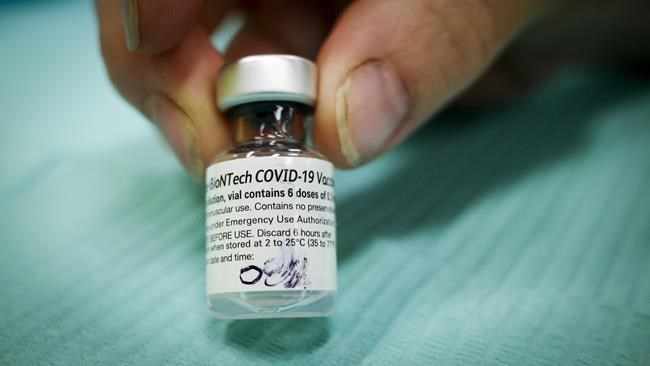OTTAWA — The first COVID-19 vaccine for kids under 12 could be in front of Health Canada's review team in just days, and Pfizer expects to start shipping a new pediatric formulation of its vaccine shortly after it gets the green light.
But some Canadian pharmacists are hoping Canadian authorities authorize them to just draw up pediatric-sized doses from the vials of vaccine already shipped for Canadians over the age of 12.
Pfizer submitted data from a clinical trial involving kids five to 11 years old last week, and made the formal request for it to be authorized for that age group in the U.S. Thursday.
The company's Canadian spokeswoman said the company is working with Health Canada on the final steps before that formal request is made here.
"We are aiming to file this submission by mid-October," said Christina Antoniou.
The vaccine was developed in partnership with Germany's BioNTech and is now marketed under the brand name Comirnaty. It was authorized for people at least 16 years old last December, and for kids between 12 and 15 in May.
The pediatric data on kids between five and 11 showed a safe and strong immune response from two doses, which are one-third the size given to teens and adults.
More than 80 per cent of Canadians over 12 are now fully vaccinated against COVID-19, and as vaccines help slow infections in teens and adults, the infection rate among kids has climbed.
Kristen Watt, a pharmacist and owner of Kristen's Pharmacy in Southampton, Ont., said she is getting lots of questions from parents about the vaccine and whether to sign their kids up when it’s time.
"We know from the questions that we're getting that it's going to be an uphill battle," she said in an interview. "So getting ahead of what the plan looks like for rollout is really, really important. We really need this to be calm, straightforward, and seamless."
She said while it's true the disease tends to be more mild among kids in general, there are kids who get seriously ill and end up in the hospital and others who end up with long-term symptoms.
"We've done a lot of things to mitigate spread in kids so far so why wouldn't we make this our top priority to continue to reduce that risk for kids," she asked.
Watt doesn't think there is a good reason why Canada should risk delaying getting doses into arms by waiting for Pfizer to deliver more vials specifically for kids, when pharmacies and public health clinics can easily just use the same syringes to draw the smaller doses of the vaccine.
Pfizer has delivered more than 46 million doses to Canada to date, and an analysis of the available data on administration from provincial and federal governments suggests there are more than enough Pfizer doses already in Canada to vaccinate kids between five and 11 years old.
But that's not what Pfizer is requesting in its submission to Health Canada.
"The rollout of new formulations, including doses of our vaccine for this age group, has been incorporated into the supply agreement that Pfizer and BioNTech have with the Government of Canada," Antoniou said.
"A delivery schedule for the pediatric formulation will be determined shortly after regulatory approval is granted with the intent of bringing doses to Canada as quickly as possible."
Canada signed a new contract with Pfizer for pediatric doses last spring.
Watt said waiting for new deliveries will delay vaccinations, and that pharmacists could vaccinate the day after it gets approved if they can use the vials they already have. The existing vials hold six adult-sized doses, but would hold three times as many doses for kids.
She said she hopes the National Advisory Committee on Immunization weighs in soon to clarify if that can happen. She said one concern may be contamination if a vial is accessed 18 times instead of six, but that can be mitigated with adapters.
This report by The Canadian Press was first published Oct. 7, 2021.
Mia Rabson, The Canadian Press




